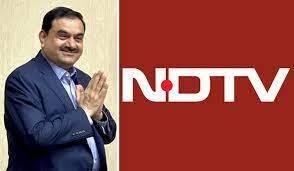
Adani's Takeover of NDTV
✍️ Charan S Gowda & Nama Sai Pranav
Published: 2023-02-15
On the 22nd of December 2021, it was announced that Gautam Adani, chairman of the Adani Group, would be acquiring a controlling stake in NDTV, one of India’s most prominent media houses. The announcement caused an uproar in the Indian media industry and raised questions about the future of free speech in the country.
NDTV, or New Delhi Television Limited, was founded in 1988 by Prannoy Roy and Radhika Roy. Over the years, it has become known for its critical reporting on the government, particularly on issues of corruption and human rights violations. Its coverage has often been seen as being in opposition to the ruling party, Bharatiya Janata Party (BJP), and its leaders.
Adani, on one hand, is a businessman who has made a fortune in various industries, including ports, airports, and power. His wealth has grown significantly in recent years, and he has been expanding his influence in various sectors of the Indian economy. The latest revelations made in the Hindenberg report about Adani & Co. have put Adani under the spotlight. Some say that his acquisition of a controlling stake in NDTV is just the latest move in his efforts to diversify his portfolio.
On the other hand, there are those who see the takeover as an ill-intended move to silence critical voices in the Indian media. NDTV has a history of reporting on issues that the government and the ruling party would rather not have in the public eye. With Adani now in control of the media house, many fear that this critical coverage could be suppressed or toned down to avoid offending the new owner.
The takeover of NDTV by the Adani Group is part of a larger pattern of media consolidation in India, which has seen the rise of a small number of powerful conglomerates that control much of the country’s media output. This infact is seen by some as the extension of the “Godi media “, a term used by the opposition to refer to media outlets in India that are overly supportive of the government and its policies, and are accused of being biased towards the ruling party. The term “Godi” in Hindi means “lap” , and the term is used to suggest that the media outlets are sitting in the lap of the government and care only about its interests.
The implications of this consolidation of power are significant. A free and independent media is essential to any democracy. It plays a vital role in holding the government and its leaders accountable, and it provides a platform for the voices of the marginalized and the oppressed. When the media is controlled by a few individuals who have a vested interest in the status quo, these functions are undermined, and the public is deprived of its right to information which is not biased.
So, is Adani’s takeover of NDTV just another corporate deal, or is it a silencing act? The answer to this question is not clear-cut, as both views have merit. On the one hand, the deal can be seen as a routine corporate transaction, with the Adani Group simply seeking to increase its profits and market share. On the other hand, the takeover can be seen as a threat to media freedom and independence, as the Adani Group’s close ties to the government and its financial power give it significant control over the media landscape in India.
In conclusion, control of media houses by people with vested interests has significant implications for the future of the media industry in India and the state of free speech in the country. The concerns about the deal are justified, and there is a need for the government to step up its regulation of the media.
